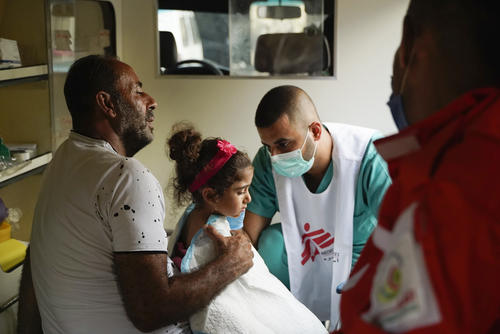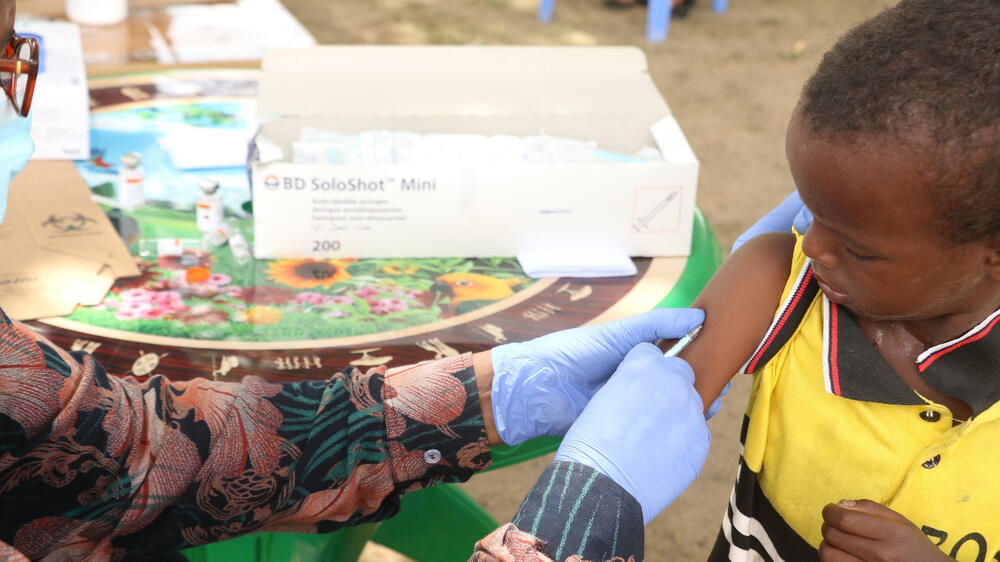Measles: The race to save thousands of children in southern Somalia
Thirty-three-year-old Raaliyo Abukar Shuuriye, from the Somali border town of Dhobley, knows that measles can kill.
“Measles is a deadly disease and I know people whose children have died from it,” she says.
As recently as March and April, two children under five died from measles in Dhobley during the town’s most recent outbreak.
So, when Raaliyo heard that medical teams were vaccinating against measles, she was keen to get her 19-month-old twins and her three older children protected.
“Measles is believed to be responsible for more child deaths than any other single microbe, due to complications from pneumonia, diarrhoea and malnutrition”
In May 2021, MSF supported Ministry of Health staff to run a month-long measles vaccination campaign in the town, which is in Somalia’s Lower Juba region.
Teams vaccinated 7,859 children aged from six months to 15 years old against the disease. The young patients were also given vitamin A supplements, while those under five were checked for malnutrition and referred for treatment if needed.
A killer disease
Measles is highly prevalent in most parts of Somalia, affecting children of all ages all year round. However, the most vulnerable are children under the age of five.
The virus spreads when infected people cough or sneeze, and is so contagious that one infected child can spread it to up to 90 percent of unvaccinated children nearby.
Measles: Our work in numbers
147,985
PEOPLE TREATED FOR MEASLES BY MSF IN 2023
3,295,700
VACCINATIONS AGAINST MEASLES BY MSF IN RESPONSE TO AN OUTBREAK IN 2023
95%
OF MEASLES DEATHS OCCUR IN LOW-INCOME COUNTRIES
The south of the Lower Juba region doesn’t have a properly managed programme for routine vaccinations – owing to a poor healthcare system – so small-scale measles outbreaks are frequent.
“The communal nature of Somali people makes it even easier and faster for measles to spread within the population, making the disease highly prevalent in the Jubaland region,” says MSF medical advisor Adan Abdi.
Since 2014, outbreaks in Jubaland have seen 3,904 children infected with measles and 29 deaths, according to the Ministry of Health. Many more cases are believed to have gone unreported.
Medical care where it's needed most
Help us care for people caught in the world's worst healthcare crises.

Reaching remote families
Controlling vaccine-preventable diseases such as measles is a huge challenge in Somalia.
This is due to low routine vaccination coverage, population movements and the difficulties of reaching children who live in highly insecure areas or regions with poor roads and infrastructure.
There are also pastoralist families who move from place to place, and unvaccinated children from remote areas may spread the disease when they visit towns.
“Overcrowding, insecurity and low vaccination coverage are all factors that contribute to the spread of this disease,” says Abdi.
“Measles is believed to be responsible for more child deaths than any other single microbe, due to complications from pneumonia, diarrhoea and malnutrition. Therefore it is important to have a high vaccination coverage between the population.”
Measles also frequently results in acute vitamin A deficiency, which can lead to blindness. Globally, half of children who become blind die within a year, according to the World Health Organisation.
“I’m very happy to have got my five children vaccinated today,” says Raaliyo Abukar Shuuriye, as she leaves the vaccination site.
“We would really appreciate having these kinds of services brought to our doorsteps more often.”
MSF and measles
Measles is one of the leading causes of death among young children.
It is a highly contagious viral disease. A safe and effective vaccine has existed since the 1960s but outbreaks still occur due to ineffective or insufficient immunisation programmes.
